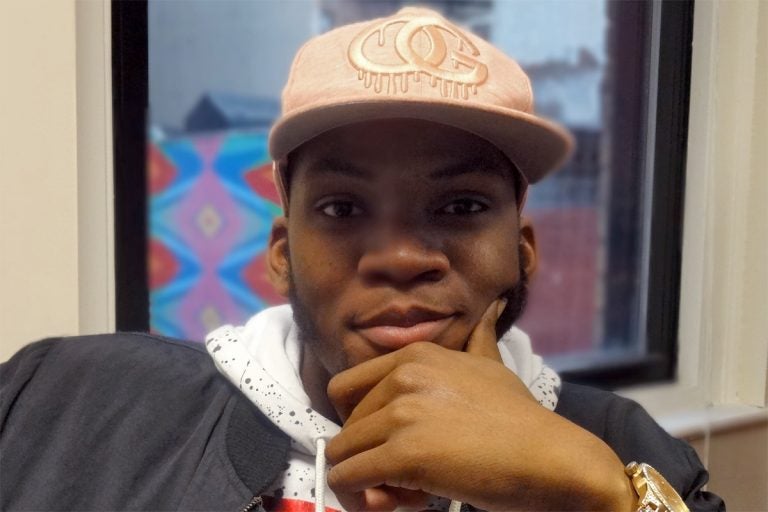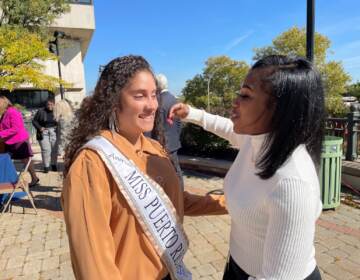Navigating public education for foster youth is a bumpy road
As I reflect on my past within the Philadelphia school system, I remember that I crossed paths with many young people who faced challenges throughout their lives.

Anthony Simpson (Image courtesy of Juvenile Law Center)
In December, WHYY content partner The Philadelphia Public School Notebook released an edition dedicated to the issues youth in foster care face in school. Juvenile Law Center invited youth advocates from their Youth Fostering Change program to share their own stories. For related discussion, follow #FosterEdSuccess and #PHLed on Twitter.
—
At 16 I entered care with my six siblings. I was placed in Youth Emergency Services. Initially this was intended to be a 30-day stay, but it was extended two months because my social worker at the Department of Human Services was unable to find a foster home that would accommodate all seven of us. This was important because we voiced that we did not want to be separated during our time in care.
Soon after, I moved to a foster home in North Philadelphia for a very short time. It was then that I first entered the public school system. I attended the local school for only a week before moving again to West Oak Lane. This move was important because I would be in a home that could support at least me and my two younger brothers. It was also during this time that I officially began attending Martin Luther King High School.
At first, I was nervous about entering the new school, but my social worker was very supportive and helped me to acclimate to this new environment. As a child, completing my school work came so easy to me, because being homeschooled afforded me the luxury of working at my own pace. Unbeknownst to me, this was quicker than the pace at which they taught at most public schools in Philadelphia.
However, I soon found out that many of my credits from my homeschooling would not transfer over to my new school. I was devastated and began to get frustrated about finishing.
Finding myself in ninth grade classes at 16 sapped my enthusiasm to excel or engage. After one semester I began skipping classes and spending more time in the hallways. In addition, being in a brick-and-mortar school came with many distractions. Establishing social status in school was my focus. On top of everything going on at school, I was also concerned about my lack of connection with my foster parent and had a growing uncertainty about when I would return home.
During the middle of my second semester, my behavior reached its peak. After an altercation with one of my classmates, I was removed from MLK High. This incident put a severe dent in my case planning, and I was told a “solution” had to be found if I was going to continue my journey towards reunification with my family.
At this time, because of a series of misunderstandings with my foster parent, I was moved to my third and final foster home. It was then that my social worker presented me with the opportunity to attend an accelerated education school. This was offered to me as the best option to gain credits so that I would be able to graduate on time. I decided to take the offer and began attending an accelerated school at Philadelphia Opportunities Industrialization Center.
Soon after starting I felt my case planning was finally going how I wanted it to go. I was to be reunited with my mom and would return home. While I was excited that this would finally be my last move, it put me so far from the accelerated program that I could no longer attend because of the commute. So, after much debate, I decided to attend one of the education programs at JEVS Human Services and pursue my GED.
As I reflect on my past within the Philadelphia school system, I remember that I crossed paths with many young people who faced challenges throughout their lives that impacted where they are today. The biggest difference was made by the support systems around them. Today, at 21, I am in the process of considering post-secondary options and am still dealing with the impact of placement disruption on my education.
While these challenges still directly impact my life, some of the stress has been alleviated with the help of the wonderful and supportive staff at Juvenile Law Center. I can only imagine the impact their presence would’ve had earlier in my time in the foster care system.
My hope is that by sharing my experience I can shed light on the ways being in the system can affect your outlook and hinder your goals, and I can show that if you remain persistent and surround yourself with positive individuals, it is possible to maintain a brighter view of the future. That will make all the difference.
—
Anthony Simpson is a youth advocate with the Juvenile Law Center, where he uses his passion, background, and skills to advocate for other foster youth. His ultimate educational goal is to attend the University of Pennsylvania and major in criminal justice.
WHYY is your source for fact-based, in-depth journalism and information. As a nonprofit organization, we rely on financial support from readers like you. Please give today.




